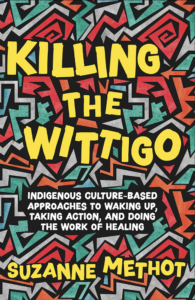Book review: Killing the Wittigo: Indigenous Culture-Based Approaches to Waking Up, Taking Action, and Doing the Work of Healing
Doing the work – that’s the hardest part of healing. One can take as many workshops or attend conferences, but unless you sit down and start doing the work will you see change.
It is hard to do this work. The book, Killing the Wittigo: Indigenous Culture-Based Approaches to Waking Up, Taking Action, and Doing the Work of Healing, is a book for young adults, literacy learners, or reluctant learners, but I’m an adult and I think this is the best self-help book that I’ve ever used to do ‘the work’. Author Suzanne Methot, a teacher and social worker, explains historical trauma, lateral violence, identity, setting boundaries, complex trauma, and more. She takes you on your own journey by hearing the voices of other youth, breaking complicated feelings and topics down, and takes you from surviving to thriving.
Killing the Wittigo explains about physical, mental, and emotional self-care. It’s interesting how people adapt to trauma to survive, but that’s all you’re doing – surviving. This could be an intergenerational pattern of coping that is passed through generations and therefore entire communities. Methot uses youth voices, stories, and song lyrics of those who have begun their own healing journey on the way to change.
There are bold statements that make you really think – ones like, “Kids who never get their feelings validated grow into adults who blame themselves for their loneliness and pain” or “Having a story about our experience(s) changes how we see ourselves. It fixes the separation between feelings, memory, and sense of self”.
There is an entire section on systems and institutions that I found very interesting. “Indigenous people are not well-served by the systems and institutions of colonial society. What does it mean to be trauma-informed? Can colonial systems be Indigenized?”. I once had a discussion with a teacher-friend who spoke about the definition of success. Colonial society sees success when a student graduates from high school and then post-secondary and gets a great job. What about the success of a student who decides to attend class every day? That is success. Students thrive and desire land-based learning instead of sitting in a classroom all day long.
Eye-catching graphics and illustrations make this work digestible. Oh, and what is a wittigo? According to Methot, “It’s a cannibal spirit creature from oral traditions of many Indigenous nations. It can take possession of a person’s soul, and it can haunt a community. When a person is possessed by the wittigo, they lose their humanity, destroying their family members and those they love the most. Stories about the wittigo warn us to practice kindness, sharing, and self-control”.
This is an excellent book for youth – or anyone – looking to achieve true, transformative change in their lives.
Suzanne Methot, Killing the Wittigo: Indigenous Culture-Based Approaches to Waking Up, Taking Action, and Doing the Work of Healing. Toronto, ON: ECW Press, 2023.
ISBN 978-1-77041-724-3



